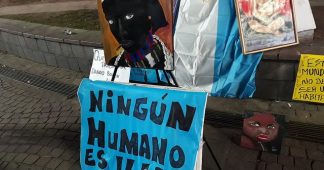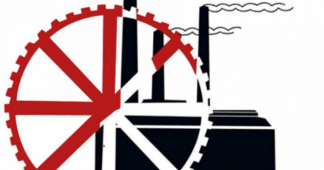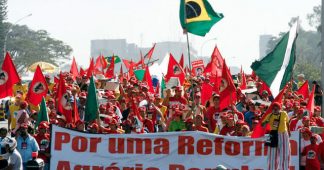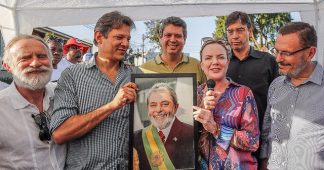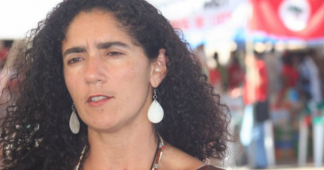Call for Participation to the VIIth International Gathering of the “The Worker’s Economy”
Florestan Fernandes National School (ENFF), Guararema, São Paulo, Brazil
September 25–29, 2019
The VIIth International Gathering of “The Workers’ Economy” will take place at the Florestan Fernandes National School of the Movimento Sem Terra, in Guararema, State of São Paulo, Brazil, between Septembr 25–29, 2019.
We invite the participation of all workers, activists, students, and anyone from or interested in recuperated and self-managed enterprises, cooperatives and social and solidarity economy organizations, as well as trade unions, social movement protagonists, and academics interested in and committed to self-management practices and the project of a new workers’ economy.
- Background
The International Gatherings of “The Workers’ Economy” have occured every two years since 2007 as a forum for discussions and debates between workers, social and political activists, intellectuals and academics interested in the problems and potentialities of what has been defined as the “Workers’ Economy” – the economy viewed from the perspective of worker and community self-management and based on the defense of working people’s rights and interests in the current contexts of global capitalism.
The VIIth International Gathering of “The Workers’ Economy” will offer a space to hear from and enagage with myriad experiences of self-management – from those innovated in South America, such as the worker-recuperated companies and enterprises of Argentina, Uruguay and Brazil; the cooperative movements of urban, rural, and Quilambola workers; and the experiences of co-management in Bolivarian Venezuela; to the growing experiments with worker and platform cooperatives, union–cooperative and alternative union models; and numerous other experiments in the social, solidarity, or communal economy of the global North and South. The VIIth Gathering will also be an opportunity to discuss both the intensification of capital expansion and accumulation on a global scale and its perpetuation of outsourcing, factory closures, unemployment, and precarity; and today’s reinvigorated forms of cooperativism, workers’ association, self-management, and exchange.
Now, more than ever, coming together to discuss these themes is vitally necessary. Historical issues and new problems faced by workers have converged in these times of neoliberal hegemony, and they need to be critically rethought and actualized. Today, for instance, we see a heightened neoliberal offensive sweeping Latin America, a resurgence of neo-fascist regional geopolitics and state coups, and profound social setbacks. This VIIth Gathering will provide a space to critically evaluate our new geopolitical reality and take indepth looks at real and radical alternatives by and for working people.
To date, six International Gatherings of “The Workers’ Economy” have takeng place, with participants from over 30 countries from the Americas, Europe, Africa, and Oceania. These have included: Buenos Aires (2007 and 2009), México City (2011), João Pessoa, Brazil ( 2013), Punto Fijo, Falcón, Venezuela (2015), and Pigüé, Argentina (2017).
At the 2013 International Gathering in João Pessoa, it was decided that regional meeetings, alternating with the International Gatherings, would also be organized every two years. Since then, Regional Gatherings of “The Workers’ Economy” have been organized with great success in Europe and the Mediterranean – in the worker-recuperated factory Fralib in Gémenos, Marseille, France (2014); in the worker-recuperated factory Vio.Me, in Thessaloniki, Greece (2016); and in the RiMaflow worker-recuperated fatory in Milan, Itay (2019). Regional Gatherings have also occurred in South America in the Argentine worker-recuperated factory Textiles Pigüé (2014), in Montevideo, Uruguay (2016), and in Santiago, Chile (2018); and in North and Central America and the Caribbean, all three times in Mexico City (2014, 2016, and 2018), with the latest occurring at Luz y Fuerza del Centro Cooperative, a story the worker-led recuperation of the energy-sector remerging out of the dedicated struggles of the Mexican Union of Electricians.
- Rationale
In the countries of the so-called “Third World,” especially in Latin America, broad social movements, workers’ movements, and grassroots organizations have been developing bottom-up processes of organization. In many cases, these experiments have expressed themselves as the self-management of productive entities or services, including worker-recuperated firms and other forms of co-management, workers’ control, and the self-management of labor, both urban and rural. In some cases, these popular movements have gained influence at the government level, as witnessed in several South American countries today.This has inserted the question about the role of states in these processes, potentializing these as an object of dispute within hierarchical power apparatuses, and bringing again into debate the relationship between state power and the autonomy of popular movements. The new phase of neoliberal authoritarianism and fascism has sharply challenged these movements, thus threatening the durability experiences of the workers’ economy, particularly their economic capacity to act in the context of capitalist markets and have influence on public policy.
The Gathering of “The Workers’ Economy” seeks to debate these and other questions as they relate the struggle of workers, bringing these questions to light within different perspectives and national, regional and international contexts. It aims to do this by bringing together academics committed to these struggles with workers and social activists. The Workers’ Economy” gatherings are also spaces for dialogue and debate that have been inspired by and have had as their starting point the experiences of workers’ self-management With representatives from more than 30 countries, worker-recuperated enterprises, self-managed workers, cooperatives, union-based labor movements, rural workers, social movements, political movements, and intellectuals, among others, have been developing these encuentros over successive editions of “The Workers’ Economy” encuentros.
We reiterate here what we emphasized in previous encuentros: “While perhaps in uneven (yet non-hegemonic) ways, the different sectors and expressions of an increasingly diverse working class are already inventing alternatives that are not limited to the economic sphere. These alternatives overlap into wider cultural processes that, based on non-capitalist relations, offer glimpses of prefigurative spaces where internal relations of power and gendered structures, as well as the relationship between workers and the wider community, can once again be debated and discussed. These processes, visible for example in worker-recuperated factories and nascent forms of self-managed spaces, show that all workers—women and men—can, from out of conscientious planning, present to humanity an alternative model to capitalism.”
Through both critical reflection and resistance to the capitalist management of the economy, the purpose of the VIIth International Gathering of the “The Workers’ Economy” is to continue to articulate and systematize these experiences, as well as bring to light the myriad ways working people are shaping their own organizations and socio-economic realities.
III. Thematic Areas
The VIIth International Gathering of “The Workers’ Economy” will be organized along, but certainly not limited to,the following thematic lines:
- Political and economic analysis of the global capitalist crisis
- Self-management as practice and as alternative project
- The challenges of unions and other forms of waged workers’ organizations facing global neoliberal capitalism
- The growing precariousness and informality of work: Exclusion, inclusion or reformulation of the way of working in global capitalism?
- The workers’ economy and issues relating to gender
- Articulation and integration of the workers’ economy
- State and public policies in the workers’ economy
- Popular education and knowledge building in the workers’ economy
- Methodology and Structure of the Gathering
Throughout the various International and Regional Gatherings of “The Workers’ Economy” over the years, we have developed a methodology for debate and dialogue that aims to facilitate deep discussions of the thematic areas and ensure the full participation of a diversit of voices. The thematic areas have been developed to organize the debate rather than strictly limit the discussion to these themes. Given the variety of participants – workers, social movement protagonists, and academics – we include four outlets for particiaption and discussion:
- Presentation Tables: These include presenters invited by the organizers to discuss key areas related to the main themes. They are organized with the intent of combininh national and international presenters and include participants’ interventions and questions. Presentation tables will take place at a central space and will not run concurrently with other activities.
- Working Tables: These are organized by themes and run concurrently. They combine formal paper presentations with workers’ and practioners’ presentations of their experiences (workers and practitioners will not need to submit written publications but rather a brief synthesis of their topic of discussion).
- Working Commissions: These are open spaces without predetermined presenters in order to openly discuss the various themes emerging in the Gathering. Working commissions will be led and inspired by the content presented in the presentation and working tables.
- Workshops: These are workspaces focused on themes and specific propositions centred on participatory methodologies, organized following the thematic areas of the gathering.
- Key Dates
Please send all of the following materials to: 7ecotrab@gmail.com
- Deadline for article abstracts: 15 July, 2019.
- Deadline for presentations for Working Tables, Working Commissions, and Workshops: July 15, 2019.
- Deadline for submission of full papers: August 15. Articles can be written and presented in Spanish, English, French or Portuguese.
- Formatting: Length of papers up to 15 pages, 1.5 spacing, Times New Roman, 12-point font.
- Those who wish to have a certificate of attendance issued by the Universidade Estadual Paulista (UNESP) must register on the UNESP website that will be available in July, at a cost of R$20.
- Deadline for booking accommodations at the Florestan Fernandes National School (ENFF): August 15, 2019 (see below for more information).
- Deadline for booking of accommodations at the site next to ENFF: August 15, 2019 (see below for more information).
Registration
For registering to the VIIth International Gathering of “The Workers’ Economy” go to:
VII. Location of the VIIth International Gathering of “The Workers’ Economy”
The VII International Meeting will be held at the Florestan Fernandes National School (ENFF) in Guararema, São Paulo.
Located around 45 km from Guarulhos International Airport, in Guararema, on the Presidente Dutra Highway.
The Florestan Fernandes National School (ENFF) is a training center for social movements, founded and developed by workers from all over Brazil and organized collectively under the principels of self-managed work.
The ENFF has rooms for 100 people, space for 20 people to camp, full bathroom facilities, 3 Auditoriums (for 250, 110 people, and 80 people), numerous meeting rooms, 4 classrooms, a sports court, a restaurant for 150 people, 3 kiosks, a cultural activities room, and a space for children.
Price for Accommodation and Daily Visit at the Florestan Fernandes National School
Note: All payments due upon arrival and not before.
Accommodation at the ENFF is priced at R$80 (around $25 dollars) per day per person. This value includes breakfast, lunch, dinner and lodging
Cost to spend the day, which includes lunch, afternoon snack, and dinner: R$35.00
The value of the Brazilian Real is approximately R$3.80 = $1.00US.
Deadline for reserving accommodations at the ENFF: August 15, 2019
Alternative Accommodations 2 km from ENFF
There is a hostel that accommodates 100 people 2 km from the ENFF
The daily rate is R$80 with breakfast included
Deadline for accommodation reservations at the hostel: August 15
Solidarity Accommodation in Guarulhos, Jacareí and São José dos Campos
If the number of participants is greater than 200, the organizing team will provide solidarity lodging at the home of workers in the nearby cities of Guarulhos, Jacareí and São José dos Campos.
Additional Hotels in the cities of Jacareí and São José dos Campos
The closest cities to the ENFF are Jacareí and São José dos Campos, around about 30km from the ENFF.
We will soon make available additional possibilities for hotel accommodations in Jacareí and São José dos Campos.
VII –Organizing Committee in Brazil
GPOD-UNESP
SOLTEC/NIDES – UFRJ – Núcleo de Solidariedade Técnica da UFRJ
LABOR/UFRPE
GPERT – Grupo de Pesquisa em Empresas Recuperadas por Trabalhadores
ITCP – USP – Incubadora Tecnológica de Cooperativas Populares
MST São Paulo – Movimento dos Trabalhadores Rurais Sem TErra
NESOL- UFT – Núcleo de Economia Solidária
UFMS
UNISOL
UCPEL
Support
ENFF- Escola Nacional Florestan Fernandes
UNESP – Universidade Estadual Paulista
UFRJ – Universidade Federal do Rio de Janeiro
UNISOL
Technical Support Team
Lucca Perez
Hector Melean
Maria Pessoa
International Organizing Committee
Argentina: Programa Facultad Abierta (Fac. de Filosofía y Letras, Universidad de Buenos Aires); Cooperativa de Trabajo Textiles Pigüé; FEDECABA; FACTA; ACTRA; Red Gráfica Cooperativa; Cooperativa 19 de diciembre, Casa de los Trabajadores (Córdoba); IDELCOOP; Programa Relación Capital-Trabajo Ciecs-Conicet, Universidad Nacional de Córdoba; Carrera de Relaciones del Trabajo, Universidad Nacional Arturo Jauretche; Instituto de Ciencias Antropológicas (FFyL-UBA); Red TISA-Universidad Nacional de Quilmes; Asociación Civil; Cátedra Libre de Fábricas Recuperadas de la Universidad Nacional de La Plata; Centro Cultural de la Cooperación “Floreal Gorini”, Programa de Articulación Territorial-Universidad Nacional de San Martín (UNSAM) ,
Italia: RiMaflow y Officine Zero worker-recuperated enterprises.
Francia: Asociación por la Autogestión; Union Syndicale Solidaires
Canadá: Centre for Learning, Social Economy & Work of the University of Toronto;
Toronto Airport Workers’ Council
Colombia: Federación Nacional de Trabajadores del Estado, los Servicios Públicos y la Comunidad, ÚNETE
Chile: TRASOL
Venezuela: Movimiento Nacional por el Control Obrero; Plataforma de Lucha de los Consejos Socialistas de Trabajadores; Movimiento Uníos.
México: Área de Estudios del Trabajo y Departamento de Relaciones Sociales de la Universidad Autónoma Metropolitana-Xochimilco; Colectivo de Cooperativas de la Nueva Central de Trabajadores; Centro para la Justicia Global A.C. en San Miguel de Allende; Trabajadores Democráticos de Occidente Sociedad Cooperativa (TRADOC); Coop. LF del Centro; Sindicato Mexicano de Electricistas (SME); Programa de Autogestión Cooperativa (PAC) de la Universidad Autónoma de la Ciudad de México;
Uruguay: Centro de Formación y Documentación en Procesos Autogestionarios: Red temática de Economía Social y Solidaria de la Universidad de la República; Asociación Nacional de Empresas Recuperadas por sus Trabajadores; Federación de Cooperativas de Producción del Uruguay (ANERT); Instituto Cuesta Duarte, Espacio de Autogestión y Plenario Intersindical de Trabajadores – Convención Nacional de Trabajadores (PIT CNT); Federación Uruguaya de Cooperativas de Vivienda y Ayuda Mutua (FUCVAM) y Coordinadora Nacional de Economía Solidaria.
Greece: Fábrica Recuperada Vio.Me; Cooperativa Pagkaki; Enallaktiki-drasi (Acción Alternativa para la Calidad de Vida).
Croatia: Organisation for Workers’ Initiative & Democratization
China: Chinese Working Women Network
South Africa: The Community Healing Network
International: Workerscontrol.net
Contact for the International Organizing Committe of “The Workers’ Economy” Network:
For more information, and to register and send proposals, email: 7ecotrab@gmail.com
